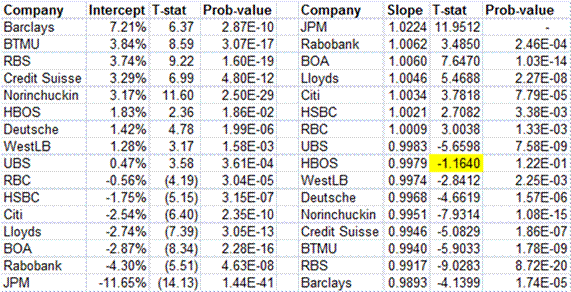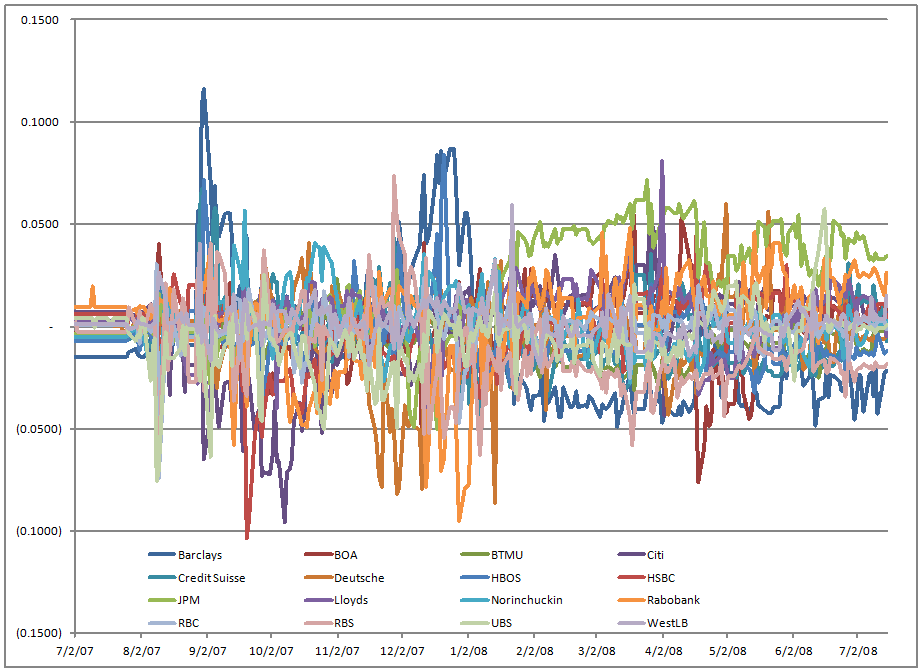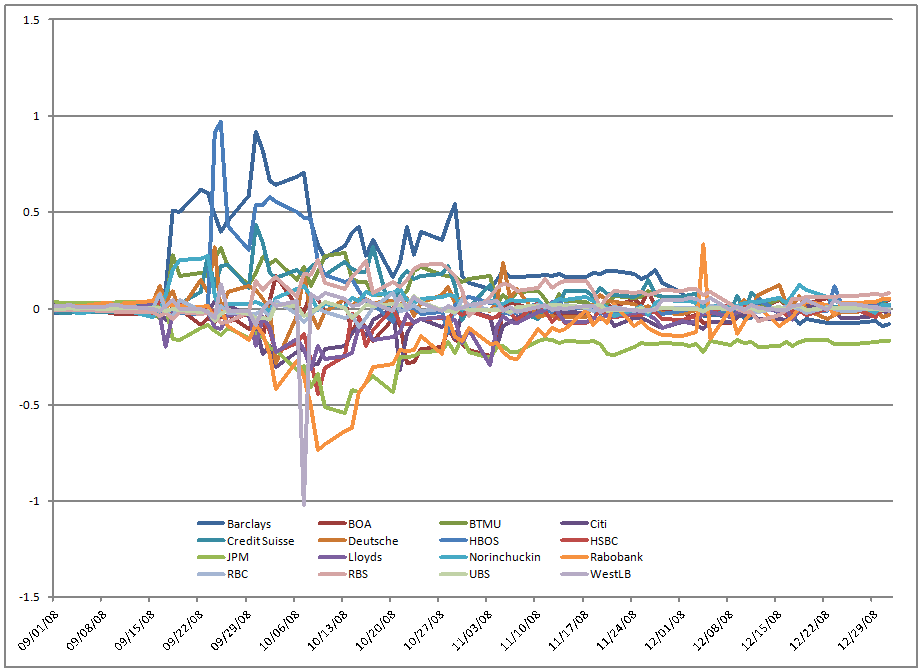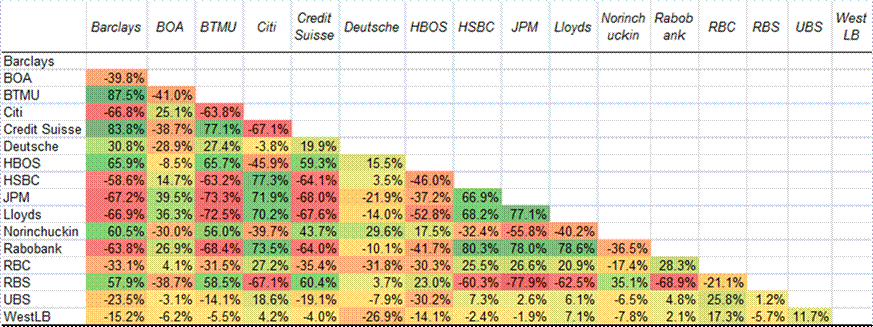I downloaded the data for LIBOR over the period 2005-2008, and decided to run regressions of the 3-month rates submitted from each bank versus 3-month LIBOR, since I think it is the most commonly used.? Here are the results:

Note the inverse relationship between the willingness to be above the consensus, and the willingness to move with the consensus.
Those that were above the LIBOR rate were in general less willing to adjust to changes in LIBOR whereas those below were more willing to adjust.? This could all be an artifact of being in a declining interest rate environment.
Also note that JP Morgan was below the LIBOR consensus by more than Barclays was above it.? Why is JP Morgan escaping criticism if Barclays is getting it?
Let’s look at the residuals from the regressions over the whole period:

As you can see, we had the great moderation in effect from 2005 through mid-2007. Everything was placid; central banking could not err, even as it erred by providing too much liquidity.? Financial companies could not err either.
There are three periods here: the great moderation, the SIV/correlation crisis in the third quarter of 2007, and the bank solvency crisis in the second half of 2008.? Let’s look at them closer up.
SIV/Correlation crisis, residual bank yields in percent:

Now, in the above graph which covers July 2007 vs 2008, same graph as above, just expanded for better viewing, you can see at the left the orderliness of the past.? Deviations from normal LIBOR behavior are 1-2 basis points; the banks in the middle generally agree about where LIBOR should be on any given day, and those that are in the tails are excluded from the calculation.
But the deviations are small, relatively speaking from what the banks commonly did — +/- 0.05% usually, and almost never higher than +/- 0.10%.? You can note that in 2008 JPM and Barclays get closer together.? JPM is ~5 basis points higher than its normal practice, and Barclays is ~5 lower, but given that on average Barclays was 7 basis points over LIBOR, and JPM 12 bp under LIBOR, that cuts the gap in half in that era.
But now lets take a walk on the wild side:
Banking Solvency crisis, residual bank yields in percent:

In mid-September, as the failures cascade, the submissions for LIBOR lose regularity.? Some go high, like Barclays, HBOS, Credit Suisse, and BTMU.? Others go low, like WestLB, Rabobank, JP Morgan, HSBC, Lloyds and Citi.? Most of these don’t make it into the LIBOR calculation, because they are outliers.? Sizes of the deviations are ~10x the size of what they were during the SIV/Correlation crisis.
By mid-November, semi-normalcy turns, though JP Morgan is lower than their normal practice, and Barclays starts higher, and ends the year lower than their normal practice.
The Correlation Matrix

So, if I were hunting for a conspiracy to fix LIBOR, I would look for clusters of high positive correlations, which are dark green in the correlation matrix above.? Starting with Barclays, I get BTMU, Credit Suisse, HBOS, Norinchuckin, and RBS, maybe Deutsche.? With BTMU, I get Barclays, Credit Suisse, HBOS, Norinchuckin, and RBS, maybe Deutsche.? With HBOS, I get Barclays, BTMU, Credit Suisse, but none of the rest.? By the time I am done, I have an informal group that seems to act together: Barclays, BTMU, Credit Suisse, HBOS, Norinchuckin, and RBS.
Maybe there is another cluster.? Starting with Citi, I have HSBC, JP Morgan, Lloyds, and Rabobank.? Yes, upon further inspection, that’s the second and only other cluster, which means we can ignore for now Bank of America, Deutsche, RBC, UBS, and WestLB.
Here’s my punchline: go back to my table at the top.? The first group, Barclays, BTMU, Credit Suisse, HBOS, Norinchuckin, and RBS are high LIBOR submitters (along with Deutsche, who is close to being a part of the group).? The second group, Citi, HSBC, JP Morgan, Lloyds, and Rabobank are low LIBOR submitters.? (Weaker ties may exist with Bank of America and RBC.)
My initial diagnosis is this: whether formally or informally, you have two groups of banks submitting rates for LIBOR.? One group is trying to pull LIBOR up, the other is trying to pull LIBOR down.? Statistically, if I add up their intercept terms from the first table, they both sum to 0.23%, one positive, the other negative.? Even if LIBOR were a simple average, which it is not, this is a colossal game of tug of war, with two equal teams.
As it is, LIBOR excludes the outliers, and calculates an average off of those that remain.? It’s a difficult measure to manipulate.? There may have been attempts to manipulate LIBOR, and even two groups of banks trying to pull LIBOR their own way, but successful systemic manipulation of LIBOR is unlikely in my opinion.
But if you disagree, here are the two clusters of banks, pursue their collusions:
Coalition to pull LIBOR up
- Barclays
- BTMU
- Credit Suisse
- HBOS
- Norinchuckin
- RBS
Coalition to pull LIBOR down
- Citi
- HSBC
- JP Morgan
- Lloyds
- Rabobank
Start with Barclays and JP Morgan, they are the outliers, and if there is collusion, they are the likely leaders.






